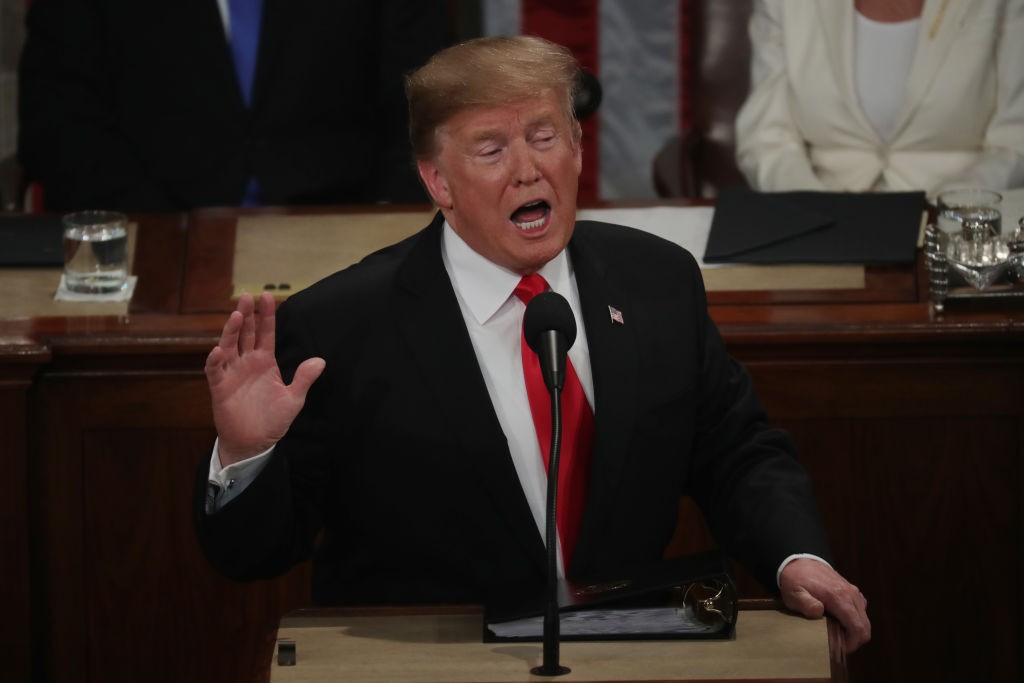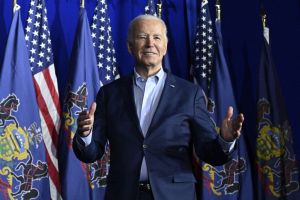Donald Trump is not always as charming as P.G. Wodehouse. Nevertheless, his magnificent State of the Union Address tonight put me in mind of this remark from the preface of Plum’s great novel Summer Lightning: ‘A certain critic,’ Wodehouse wrote, ‘made the nasty remark about my last novel that it contained “all the old Wodehouse characters under different names.”’ Waxing utopian, Wodehouse wondered whether, like the children who made mock of the prophet Elisha, that critic had by now been eaten by bears. Had he survived, though, said critic would not be able to make the same complaint about Summer Lightning. ‘With my superior intelligence,’ Wodehouse gloated, I have outgeneraled the man this time by putting in all the old Wodehouse characters under the same names.’
So, mutatis very much mutandis, did the president do tonight. SOTU 2019 bears a marked similarity to SOTU 2018. There was the same reaching across the aisle, the effort, as I put it last year, to restore the first person plural in American civic discourse, a ‘We’ that Democrats and Republicans and Independents could alike affirm.
Last year, the president spoke of putting aside the partisan passions that divide us in order to go forward as a people united in pursuing the goal of making a better America.
This year, he echoed that, noting that the choice before us was the politics of revenge, resistance, and retribution, on the one hand, and cooperation, compromise, and the common good, on the other. ‘Victory,’ he said ‘is not winning for our party. Victory is winning for our country.’ Sounds good to me. Nancy, Chuck, what do you think?
Last year, the president reached an open hand across the bitter partisan divide that has disfigured our public life these last couple of decades. There were two leitmotifs to SOTU 2018: strength, on the one hand, and a willingness to compromise on the other. SOTU 2019 reprised those elements, but added two things: 1. a fuller agenda of things to be done and 2. a more circumspect and (hole-in-the-narrative alert!) humble offer to the other side of the aisle.
In both speeches, there was, as comes with the territory, an enumeration of achievements, though in the case of President Trump the list of achievements is long, substantive, and impressive. (Can any modern president — no scratch that — can any president ever in the history of the republic boast a more stunning record of achievement in his first two years than Donald Trump? I cannot adduce one.)
Then there was over-arching theme of the speech. Last year it was the observation that ‘it is the people who are making America great again.’ This year it is ‘choosing greatness.’
Indeed, the fact, the burden, the opportunity of choice has come to fore this year.
Long before the president ascended the podium tonight, the anti-Trump media—which means, the entire establishment media industrial complex—tried to sabotage his calls for unity, his pleas for cooperation. Out of the rancid backwater of The Atlantic, for example, came the whining complaint that the president’s calls for unity rang ‘hollow,’ while ‘there at The New Yorker’ the terminally self-satisfied class of thumos-free ditto-heads complained about ‘the shrunken state of Donald Trump’s presidency.’
But all that fog, all that reflexive animus cannot conceal the astonishing success of the first two years of Donald Trump’s administration.
Shouldn’t Democrats as well as Republicans rejoice that unemployment is at a generational low and that Black and Hispanic unemployment is at an historic low? Shouldn’t Democrats as well as Republicans rejoice that economic growth, well north of three percent, is at a level declared impossible under the anemic leadership of Barack Obama? Shouldn’t Democrats as well as Republicans rejoice that manufacturing is flooding back to the US? Shouldn’t Democrats as well as Republicans rejoice at the president’s attack on the regulatory state, the monstrous regime of Title IX fanatics, and other efforts to transform ‘the land of the free and the home of the brave’ into a safe-space for chest-less pajama boys? Shouldn’t Democrats as well as Republicans rejoice that wages are rising, that inflation is stable, that the stock market is booming? Shouldn’t Democrats as well as Republicans rejoice that 2018 marked the first time in 46 years that that cost of prescription drugs dropped? Shouldn’t Democrats as well as Republicans rejoice that the president is endeavoring to rationalize our immigration policy and enforce our immigration laws? Shouldn’t Democrats as well as Republicans rejoice that the president has made historic inroads in negotiations with pariah states like North Korea and adversarial states like China? Shouldn’t Democrats as well as Republicans rejoice in his rebuilding and modernizing the US military?
The answer to all these questions is ‘Yes, they should.’ But will they? Will the Democrats look beyond their goal of grubby partisan advantage and live up to the president’s agenda as described by his former chief of staff, John Kelly. Asked what the president’s ‘agenda’ was, Kelly replied, it is, quite simply, ‘to do what’s good for America.’
The first President Bush struggled mightily with what he dismissed, or half-dismissed, as ‘the vision thing.’
The Democrats, to their credit, have never had a problem articulating a powerful vision. Barack Obama did it, for example, with his ‘Life Of Julia’ slide show, a cringe-inducing sales pitch for Obamacare so extreme that it seems to have been scrubbed from the internet. But it was nothing if not clear in its vision: the individual was to submit and be cared for by the swaddling state.
Donald Trump is also a sort of visionary. But his vision hearkens back, at least partially, to an earlier time. He has come advocating policies that promote economic growth, and hence prosperity. His vision calls for a judiciary that respects the rule of law and does not seek to legislate from the bench. His vision calls for an immigration policy that is generous to those seeking to become Americans, but generous, too, to those who are already Americans.
But back to the theme of choice. SOTU 2019, like SOTU 2018, was about Donald Trump’s fundamental campaign message: making America great again. But now we have had two years of the president’s efforts to realize that goal.
Tonight, he spoke of America’s ‘unlimited potential.’ The key is to transcend the paralyzing, corrosive, destructive atmosphere of unremitting repudiation and resistance that have shadowed the Trump administration since before his inauguration. In a speech that will surely enter the history books, the president put forth the choice in stark terms: ‘greatness or gridlock,’ ‘vision or vengeance.’ He called on Congress to get behind a long list of legislative initiatives to help America. ‘Look at the opportunities before us,’ he said in his peroration. Will we choose to be ‘defined by our differences’ or have the courage and good will to transcend them?
The ball is now in the court of the Democrats and their spokesmen in the mainstream media, the academy, and the lamentable NeverTrump sorority. I understand that they will be unhappy as they digest this remarkable piece of oratory. Even the white-clad ghostly feminists had to stand and applaud at some of the president’s remarks. How that must have hurt Nancy and Chuck.
But the age of hyper-partisanship may be drawing to a close. Of course, differences will persist. Differences are the fuel of politics. But shared goals are its motor. Donald Trump’s vision of a united country working for the common good was a powerful message powerfully expressed. What will his opponents choose? It’s up to them. Play ball, or play bawl. Which will it be? America is watching.


















